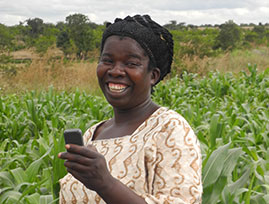|
Our Experience
Malawi Technology for Extension to Smallholders (TEXTS)
Project Description
Project Approach
In conjunction with DAES technical experts, ASI is creating an extension messaging calendar for various crops that will assist extension officers with timing and content of SMS messages to smallholders. In addition to direct training on use of the SMS platform, ASI is conducting training of trainers (TOT) to over 2,000 field-based extension officers and additional technical assistance to facilitate the further training of 16,000 smallholder farmers.
Impact and Accomplishments
By designing and implementing an SMS messaging system, ASI will greatly enhance the government’s ability to convey specific and timely agricultural information. Through direct assistance and training the TEXTS project will impact approximately 2,000 DAES rural extension staff, 400 public and private sector partners, 16,000 smallholder lead farmers and ultimately up to 400,000 farmers. This new capacity will have far-reaching implications for Malawi’s broad-based economic growth and food security.
» Back to main Our Experience page.
|


